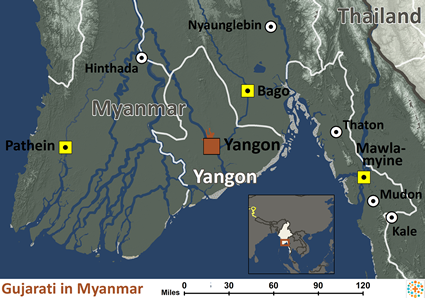Gujarati is not the name of a specific ethnic group but is a regional language spoken as the first language by approximately 170 different people groups, and as a second language by another 500 groups. The 1931 census returned 6,469 Gujarati people in Myanmar. The fact that men made up 71 percent of those polled indicates that many were laborers who had come to the country for work. Many Gujarati have the family name Patel, while the most famous Gujarati person in history was undoubtedly Mahatma Gandhi. In Myanmar, no Indian group is accepted as indigenous (including families that have lived in the country for nearly two centuries), so the people have few or no political rights and have been denied citizenship. Many Gujarati migrated back to India if they were able to do so, but others have remained in Myanmar where they have been marginalized.
Location: Despite having an estimated population of 35,000 people in Myanmar, Gujarati-speaking people are difficult to locate as they have blended in with other Indian communities, although most are believed to reside in the major cities of Yangon and Mandalay. The homeland of Gujarati-speaking people is Gujarat in western India, a state that borders Pakistan and is hemmed in by the Arabian Sea. More than 63 million Gujarati people live in India, 3.5 million in Pakistan, 1.5 million in the United States,1 and 864,000 in Canada. Millions more are scattered across the globe. One 2015 source said that Gujarati communities were found in 129 countries and that one-third of the entire Indian diaspora around the world were Gujaratis.3 They are so widespread that a joke is told that when Neil Armstrong first landed on the moon, he found Gujarati people already there!
Language: Gujarati is part of the Indo-Iranian branch of the Indo-European family. Although there are dozens of Gujarati dialects spoken in India, only three are thought to be used in Myanmar. Gujarati has its own unique script, which was first developed in the 10th century. Scholars have discovered that the scripts used by some indigenous groups in Indonesia and the Philippines were adapted from the earliest Gujarati written forms, forming a link among those people groups.
Gujarati families are often wealthy, having forged a strong reputation over centuries as skilled traders and bankers. Their access to the ocean enabled them to become a sea-faring people and helped them establish a lucrative mercantile history throughout the Persian Gulf, along the African coast, and in parts of Southeast Asia. As an example of their business prowess, the Guajarati dominate the diamond industry in Belgium, having displaced the Jews who had ruled the trade for generations.
The Gujarati have a rich and varied folklore dating back millennia. The stark differences between Hindus and Muslims have created a cultural divide between the adherents of each religion, although they acknowledge historical and ethnic kinship. Gujarati cuisine is distinct from other Indian varieties. It is characterized by a mixture of spicy and sweet tastes. Gujarati Hindus are almost exclusively vegetarians, but Muslims often use seafood, chicken, and mutton in their dishes.
Although the majority of Gujarati people in Myanmar are Hindus, centuries ago Muslim Gujarati played a key role in spreading Islam to many parts of Southeast Asia. Today, about 14 percent of Gujarati people in Myanmar are Muslims. There may also be small numbers of Sikhs and followers of Jainism among the Gujarati community.
Although 2023 marked the 200th anniversary of the publication of the Gujarati New Testament, the Christians among this group have always been just a tiny remnant of the population. Several encouraging movements toward Christ in their history met stiff resistance from Hindu and Muslim leaders and tended to fade out. Today, only about one percent of the Gujarati in Myanmar are believed to be followers of Jesus Christ.
Scripture Prayers for the Gujarati in Myanmar (Burma).
| Profile Source: Asia Harvest Copyrighted © Used with permission |




























